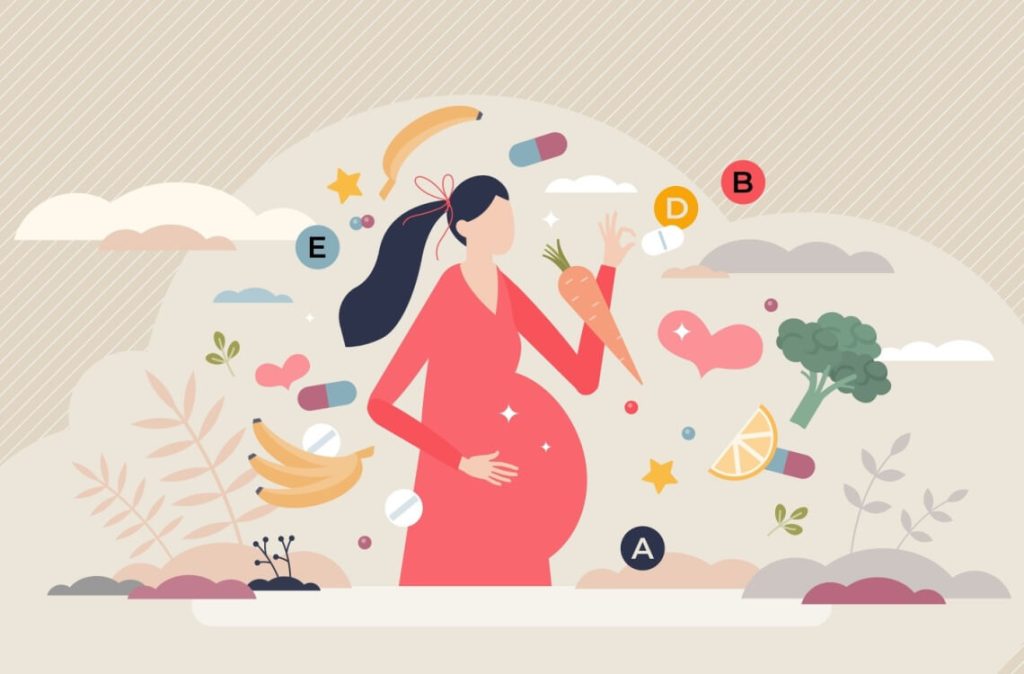Nazatul is a qualified pharmacist with 10 years of experience in pharmacy practice involving both hospital and community settings. She currently holds the position of Pharmacist and Key Account Manager at Primabumi Sdn. Bhd.
Here’s her advice on the most frequently asked questions about pre- and postnatal nutrition.
Q1: I plan to have a baby in a few months. When do you suggest I start preparing myself in terms of dietary intake?
I highly recommend optimising your nutritional intake at least three months before conceiving.
Getting sufficient nutrients before pregnancy helps one to conceive successfully.
Moreover, it also plays a vital role in supporting the health and well-being of both the child and the mother.
Q2: What are the key nutrients that I need to prioritise before and after pregnancy?
Generally speaking, the following nutrients are essential for expecting and new mothers:
- Vitamins
- Minerals
- Essential fatty acids
- Carbohydrates
- Protein
- Probiotics
Q3: What are the roles of these nutrients?
Apart from supporting a healthy pregnancy, these nutrients help maintain the mother’s energy level, ensure the good development of the baby’s organs and systems, prevent birth defects, and reduce the risk of illness later in life.
| Nutrient Type | Function |
| Vitamins and minerals | Essential for the healthy development and functioning of various organs and systems. |
| Essential fatty acids | To support healthy development of the brain, nerves and eyes. |
| Carbohydrates | An important energy source for both the mother and the foetus. |
| Protein | To form new body tissues. |
| Probiotics | To support a healthy digestive and immune systems. |
Q4: Can I get all the essential nutrients from taking health supplements?
A good pre- and post-natal supplement should ideally contain most, if not all, of the essential vitamins and minerals to support the increased need for nutrition during pregnancy and breastfeeding.
We also refer to these products as pre- and post-natal multivitamins. Some of them may combine multivitamins with essential fatty acids.
However, multivitamins in tablet or capsule form do not contain carbohydrates, proteins, or probiotics.
Q5: Which vitamins and minerals are necessary in a pre- and post-natal supplement?
Your prenatal and postnatal supplements must contain folic acid, choline, iodine, iron, calcium, and vitamin D.
The table below shows the risks associated with a deficiency of these micronutrients:
| Vitamin/Mineral | Potential Complications |
| Folic acid | Neural tube defects |
| Choline | Hypertension, pre-eclampsia, impaired liver function, neural tube defects |
| Iodine | Miscarriages, enlarged thyroid gland, tiredness, cretinism, preterm birth |
| Iron | Breathing difficulties, low energy level, weak immune system, increased risk of developing perinatal infection, pre-eclampsia, and bleeding |
| Calcium | Muscle cramps, joint pain, pelvic pain, pregnancy-induced hypertension and pre-eclampsia, preterm birth, low birth weight |
| Vitamin D | Pre-eclampsia, gestational diabetes mellitus, preterm birth, low birth weight, weak bones and muscles, increased risks for seizures and autoimmune diseases |
*Neural tube defects refer to severe birth defects of the brain and spinal cord.
**Cretinism is a condition of severe physical and mental retardation due to iodine deficiency.
***Pre-eclampsia is a pregnancy-specific complication characterised by high blood pressure, too much protein in the urine, as well as swollen legs, feet, and hands.
Q6: Do I still need to take pre- and post-natal supplements if I’m also taking specialised milk products?
This is subject to one’s eating habits, nutritional requirements, and any pre-existing health issues, which vary among individuals and during different stages of pregnancy.
Please seek your doctor’s advice on the best approach to managing your daily nutrition.
Q7: Can I take my health supplements before or after drinking milk or coffee?
Dairy products and caffeine-containing drinks (such as tea and coffee) may reduce the absorption of iron and calcium by the body.
Hence, to obtain maximum benefits, remember to leave at least a 2-hour gap between consuming milk or caffeine and taking your health supplements, especially those that contain iron and/or calcium.
Q8: Can taking too many vitamins and minerals be harmful to me and my baby?
Although vitamins and minerals are important, taking them in excessive amounts is certainly not advisable.
For instance, too much vitamin A during pregnancy may cause liver toxicity and birth defects, while overdose of vitamin C may cause nausea, vomiting, diarrhea, heartburn, and headaches.
Q9: What are some common misconceptions about prenatal nutrition that parents should be aware of?
One of the most prevalent myths is that “eating for two” is a must, which can result in overindulgence in food (and therefore, excessive weight gain) and other health risks.
Another common misconception is that all pre- and post-natal vitamins are the same.
Instead, it is important to select supplements that include the appropriate amounts of key nutrients in adequate amounts, as advised by healthcare professionals.
Source: Nazatul Amira Hamzah, Pharmacist at Primabumi Sdn Bhd
Disclaimer: The information provided in this article is for informational purposes only and should not be considered as medical advice from Motherhood. For any health-related concerns, it is advisable to consult with a qualified healthcare professional or medical practitioner.
For more insightful stories and fun recipes, stay tuned to Motherhood Story!

